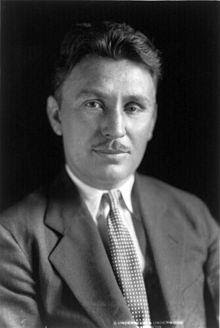CXVI
There
were very few human beings for whom Charles Lindbergh would have had to give up
his seat at the table in 1930, but among them were Wiley Post and Harold Gatty.
Wiley
Post isn’t well-remembered today, but for a brief time he nearly eclipsed
Lindbergh as a Great American Hero. Post (1898-1935) like most of his
contemporaries joined the war effort in 1917, but the war was over before he
finished his pilot training.
After the war, the Texas-born, Oklahoma-raised Post went to work as an oilman but his heart wasn’t in it, and he contrived to get his pilot’s license and become a barnstormer.
After the war, the Texas-born, Oklahoma-raised Post went to work as an oilman but his heart wasn’t in it, and he contrived to get his pilot’s license and become a barnstormer.
 |
|
Wiley
Post
|
After
a brief time barnstorming he became the personal pilot for an oil executive who
owned a Lockheed Vega named Winnie Mae.
Post raced the plane to a new world’s record on August 27, 1930, flying
from Los Angeles to Chicago in 9 hours. 8 minutes and 2 seconds.
 |
|
Winnie Mae in the Smithsonian’s Air and
Space Museum
|
In
1931, Post and his navigator Harold Gatty decided to challenge the Graf Zeppelin’s 1929 “Worldflight”
record of 12 days and 1 hour of elapsed flying time (“American Voyage”) by
making their own airborne circumnavigation in Winnie Mae. They left on June 23, 1931 and returned on July 1st.
Everywhere Post and Gatty flew, they were greeted by exultant crowds, and they
returned to their embarkation point, Roosevelt Field in New York, in just 8
days and 15 hours and 51 minutes of elapsed flying time, besting the Graf Zeppelin by three-and-one-half
days.
During
this flight, Gatty identified and named the high-altitude Jet Stream.*
In
1933, Post decided to attempt a solo circumnavigation. To do so, he had an
advanced Radio Direction Finder and the world’s first autopilot, built by
Sperry Gyroscope of Long Island, installed in the dependable Winnie Mae. He beat his own record, held
jointly with Gatty, by circling the world in just 7 days, 18 hours, and 49
minutes elapsed flying time.
This
time, the public reaction possibly even outmatched Lindbergh’s own. Post received the Distinguished Flying Cross
in 1932, and the Gold Medal of Belgium, and the International Harmon Trophy,
both in 1934. He had several airports named for him.
 |
|
Will
Rogers was a close friend of Wiley Post’s and had flown with him often. Their
floatplane suffered an engine failure, crash-landing upside down in a lagoon
near Nome, Alaska shortly after takeoff. Both men drowned, unable to free
themselves from the wreckage
|
Undoubtedly,
he would have garnered more awards and accolades, but not long after testing
the first pilot pressure suit (designed to help pilots avoid oxygen deprivation
blackouts and redouts during high altitude flights and altered gravity
maneuvers, Post was killed in a flying accident along with his close friend and
passenger, humorist and commentator Will Rogers on August 15, 1935.
 |
|
Rogers
(on the wing) and Post (making notes) just a few minutes before the liftoff
that led to their deaths
|
*Different
sources claim that Jimmy Doolittle discovered the Jet Stream. It’s also
possible that previous pilots had encountered the fast-moving stratospheric air
current before Doolittle and / or Gatty, but Gatty is always credited with
naming it.
No comments:
Post a Comment